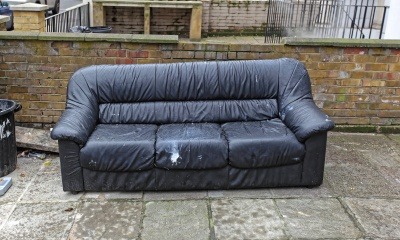Councils have briefly halted their collection of gentle furnishings, primarily upholstered seating objects. Cumbria, Cambridgeshire and the Isle of Wight have all paused functions and explained to inhabitants to hold keep of these cumbersome waste products until eventually option disposal routes, away from landfill, have been set up.
 A Cumbria County Council spokesperson told Useful resource: “We are performing with our contractors to obtain different arrangements for this squander sort which is compliant with the new laws. We anticipate to have new preparations in put by the end of January.”
A Cumbria County Council spokesperson told Useful resource: “We are performing with our contractors to obtain different arrangements for this squander sort which is compliant with the new laws. We anticipate to have new preparations in put by the end of January.”
Items affected contain sofas and armchairs, couch beds and futons, kitchen area and dining room chairs, stools and foot stools, home office chairs, bean luggage, and ground or sofa cushions.
In August the Natural environment Company (EA) introduced new bans on upholstered seating items being reused or likely to landfill, rather obtaining to be incinerated. The final recommendations were launched in December 2022.
This followed an investigation which identified that massive amounts of persistent natural pollutants (POPs) can be uncovered in seating textiles and foams which ‘remain intact in the atmosphere for very long periods’ and ‘become greatly distributed geographically’, according to the EA.
The new restrictions do not modify the legal prerequisite to use for an environmental allow to temporarily shop waste upholstered domestic seating.
POPs refer to natural and organic compounds which the European Commission defines as a group that ‘have harmful properties, persist in the setting, accumulate in food stuff chains and pose a threat to human health and the environment’.
This involves pesticides these types of as dichlorodiphenyltrichloroethane (DDT), industrial chemical compounds these kinds of as polychlorinated biphenyls and terphenyls (PCBs/PCTs), and unintentional by-products of industrial procedures, for case in point dioxins and furans. Items this sort of as sofas normally consist of polybrominated diphenyl ethers.
The new pointers have the opportunity to spot pressure on councils which do not have accessibility to the vital infrastructure to cope with the incineration of bulky POPs merchandise.
The Cumbria spokesperson ongoing: “Given the quite shorter notice of the new legislation, it did not leave enough time for the council to make essential arrangements with our contractors so we have had no preference but to quickly suspend the depositing of this waste substance at our HWRC web pages.
“We of class assistance the laws that just about anything that is a pollutant to the atmosphere wants to be addressed and disposed of correctly – our frustrations are with the quick implementation of the enforcement of the legislation which was contrary to indications formerly offered by Defra and the Setting Agency to Area Authorities.”
Cumbria’s Cabinet Member for Surroundings, Councillor Celia Tibble, claimed: “This fast implementation was unanticipated and opposite to indications formerly offered by DEFRA and the Surroundings Agency to Local Authorities.
“There is insufficient time to make the essential changes to how this type of squander is handled at our Domestic Squander Recycling Centres and as a end result, with effect from 1 January 2023, we will quickly be unable to take these things at our HWRCs.
“This is irritating and unwelcome information, and we are performing really hard to locate a longer-term remedy as speedily as probable.
“We kindly question residents looking to dispose of home goods these kinds of as these to both take a look at their local Family Squander Recycling Centre prior to January 1, 2023, or keep on being individual and keep onto any of these goods until these time we’re ready to settle for them once more.
Marketplace and council fears
Councils, committees and associations have also cited confusion over the proposed implementation day for laws, which was introduced in August and was originally said to come into power on 1 January 2023. It was later said that inspections would only start out in August 2023, and that 1 January was basically a registration date. Other councils have claimed the implementation date was verified in December to be 1 January 2023, supplying them only 1 thirty day period to get ready.
Issues about an raise in fly-tipping due to the paused collections have also been lifted, but the Cumbria County Council spokesperson told Useful resource: “Thankfully we haven’t noticed an improve in fly-tipping and we have been apparent in our public messaging that fly-tipping is a really serious legal offence for which individuals can be prosecuted.
“We also recommend men and women to check permits and waste carrier registrations for any individual who is employing a personal waste selection business to dispose of their aged seating to assure it is managed and disposed of in line with lawful specifications.”
The Nearby Authority Recycling Advisory Committee (LARAC) previously expressed severe problems about the new advice. In October it produced the benefits of a study which showed a third of its local authority customers will be afflicted by the change and count on it to lead to a ’major disruption to selection systems and their engagement with residents’.
Above a quarter of respondents claimed they felt the only way to comply with the tips would be to run two different collections for POPs and non-POPs products.
LARAC mentioned that none of the respondents noticed constructive changes in the new specifications and 55 per cent thought the would not be in a place to comply to the new regulations by the close of 2022.
Preparations for the new tips incorporate more skips at HWRCs, the expense of modifying transfer stations for the separate depositing of POPs squander, and particulate management in compaction things to do.
In November 2022, the Community Governing administration Association (LGA) warned of a absence of infrastructure to manage the new POPs collections.
Defra has commissioned analysis into the impact the new POPs polices will have on councils.
